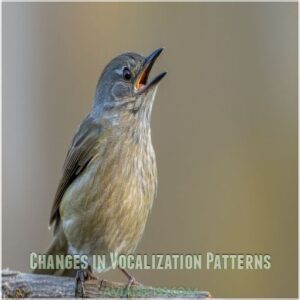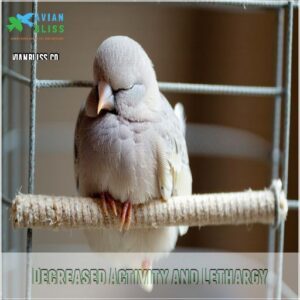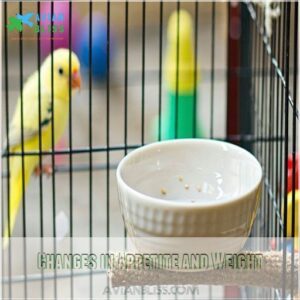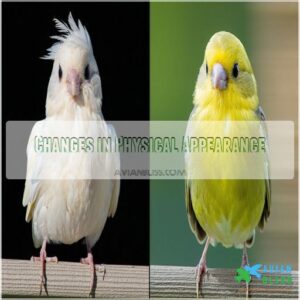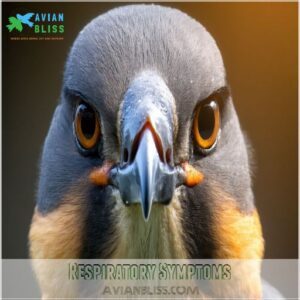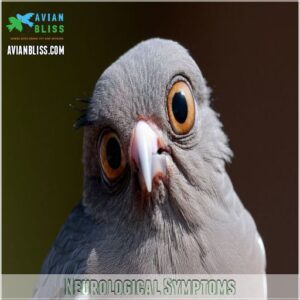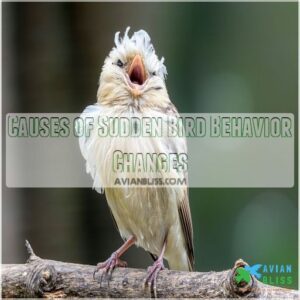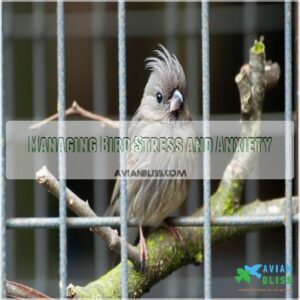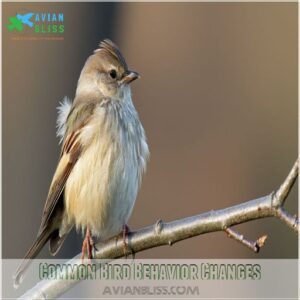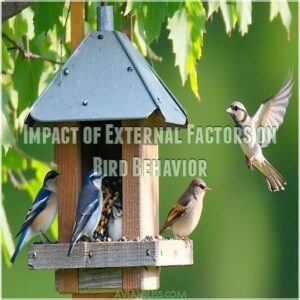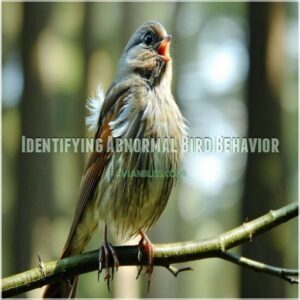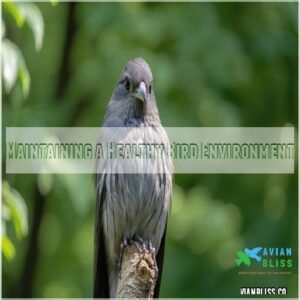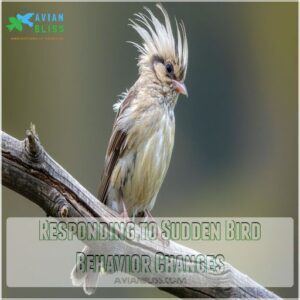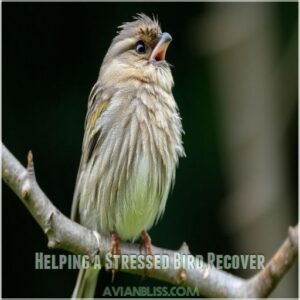This site is supported by our readers. We may earn a commission, at no cost to you, if you purchase through links.
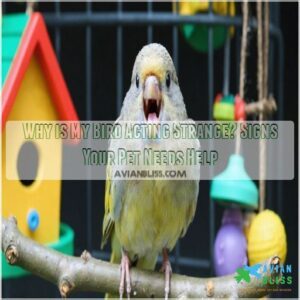
Changes in vocalization, lethargy, or appetite can signal stress from environmental shifts, illness, or even the whims of weather.
Maybe your feathery friend is startled by a sneaky predator lurking nearby or stressed by changes in their routine.
Birds are creatures of habit, after all. A sudden shift might be your bird’s subtle way of hinting at discomfort or illness.
Keep an eye out for signs like feather ruffling or unusual aggression.
Stay tuned to learn how to create a safe haven for your chirpy companion.
Table Of Contents
- Key Takeaways
- Why is My Bird Acting Strange
- Recognizing Bird Illness Symptoms
- Causes of Sudden Bird Behavior Changes
- Managing Bird Stress and Anxiety
- Common Bird Behavior Changes
- Impact of External Factors on Bird Behavior
- Identifying Abnormal Bird Behavior
- Maintaining a Healthy Bird Environment
- Responding to Sudden Bird Behavior Changes
- Helping a Stressed Bird Recover
- Frequently Asked Questions (FAQs)
- Why do birds go crazy outside?
- What causes strange bird behavior?
- Why are birds exhibiting unusual behavior before a storm?
- Are birds going crazy?
- Why is my bird squinting?
- Why do birds sway their heads?
- Why is my bird acting weird all of a sudden?
- How do birds act when they are sick?
- What does it mean when birds start acting weird?
- What is an abnormal behavior of a bird?
- How does diet influence bird behavior changes?
- Can new toys cause behavioral shifts in birds?
- How do hormonal changes affect bird behavior?
- Are certain bird species more prone to anxiety?
- How does lack of sleep impact bird mood?
- Conclusion
Key Takeaways
- Pay close attention to changes in your bird’s vocalizations, activity levels, and appetite; these can indicate stress, illness, or environmental shifts.
- Monitor environmental factors like weather changes, predator presence, and social interactions, as they can significantly impact your bird’s behavior.
- Ensure your bird’s habitat is safe and enriching, with enough space, fresh food and water, and mental stimuli to prevent stress and abnormal behaviors.
- Don’t hesitate to seek assistance from an avian veterinarian or wildlife rehabilitators if you notice persistent strange behaviors in your bird.
Why is My Bird Acting Strange
When your bird starts acting differently, it can be worrying.
Pay attention to changes in vocalization, activity levels, eating habits, aggression, and physical appearance, as these might signal that your feathered friend needs a little extra care.
Changes in Vocalization Patterns
Think your bird’s dialogue has gone off script?
Vocalization changes can be more than just quirky tweets; they might signal stress, illness, or respiratory issues, and even dietary deficiencies that can cause parrot stopped talking.
When chirps turn into squawks or the quiet sets in, it’s time to play detective.
Pay attention to these bird communication shifts, as they’re your feathered friend’s way of expressing concerns—avian behavior changes worth investigating.
Decreased Activity and Lethargy
You’ve noticed your feathered friend’s vocal quirks, but now there’s a bigger concern: a decrease in activity.
A lively bird suddenly snoozing more could mean they’re feeling off.
Birds, like us, have off days, but persistent lethargy isn’t just "birdie blues."
Make sure their perch sparks joy.
If lethargy lingers, it’s time for a vet visit.
Changes in Appetite and Weight
Is your feathered friend suddenly picky about their food? Significant appetite changes, like a sudden decrease in eating or weight loss exceeding 10%, are serious.
Meal skipping or food refusal (bird not eating) can signal illness.
Monitor your bird closely; any weight gain or loss needs attention. Consult an avian vet immediately if you see these signs.
Proper avian nutrition is key to a healthy bird.
Aggression or Irritability
Aggression or irritability in your bird might feel like a storm in a teacup, where hormonal changes, cage size, or new companions shake up the peace.
It’s tricky, but addressing bird behavior problems often requires understanding territory issues or shifting flock dynamics.
When that sweet songbird turns into a grumpy parrot, explore pet bird behavior solutions to restore harmony.
Changes in Physical Appearance
Notice your bird’s fluffed feathers or drooping wings? You might see strange changes in its physical appearance. These can be signs something’s amiss.
Look out for:
- Weight fluctuations like sudden weight loss.
- Beak changes, such as cracks or overgrowth.
- Eye discharge indicating possible infection.
These clues suggest your feathered friend needs a vet’s attention!
Recognizing Bird Illness Symptoms
Spotting signs of illness in your bird early can make all the difference in getting them the help they need.
Keep an eye out for changes like labored breathing, odd feather conditions, or sudden drops in activity.
Don’t hesitate to consult with an avian vet.
Respiratory Symptoms
Something’s off if your bird starts wheezing and gasping. Respiratory distress can appear as open-mouth breathing or tail bobbing. Keep an eye out for nasal discharge—it’s not a good look!
| Symptom | Possible Cause | Action to Take |
|---|---|---|
| Wheezing | Respiratory infection | Visit vet |
| Open-mouth breathing | Heat stress | Cool environment |
| Tail bobbing | Respiratory distress | Seek veterinary advice |
| Nasal discharge | Sinus infection | Veterinary consultation |
Prioritize your bird’s respiratory health to make sure they’re chirping happily.
Digestive Symptoms
Ever notice your bird’s bathroom habits suddenly change?
Digestive woes in your feathered friend might include:
- Vomiting or Regurgitation: Birds may eject or reject food, suggesting digestive troubles.
- Diarrhea: Loose stools signal issues, demanding your attention.
- Food Rejection: Skipping meals isn’t just picky eating—it’s a red flag for digestive health.
Monitor these signs to keep your pet bird healthy.
Neurological Symptoms
Spotting neurological symptoms in your bird can feel like finding a needle in a haystack.
Watch for signs like a sudden head tilt, seizures, or tremors.
These can indicate issues with your bird’s brain health.
Paralysis or noticeable changes in avian behavior might mean deeper neurological health concerns.
If you notice these changes, get to a vet pronto!
Skin and Feather Abnormalities
Your bird’s fashion choices could point to odd behaviors. Why the new look? Feather plucking, molting issues, or signs of skin mites might be the culprits.
- Notice persistent feather damage?
- Detect odd patterns of feather pecking?
- Spotting parasites or changes in skin health?
- Feather health looking less than glamorous?
Check for these signs when your bird’s acting strange.
Causes of Sudden Bird Behavior Changes
Sometimes, seemingly out of the blue, your feathered friend might start acting strangely.
Unusual behavior in your bird can be triggered by several factors.
Weather changes, a nearby predator, breeding season, or even a lack of food can all cause your bird to act differently.
Weather Changes
Sometimes, weather changes can make your bird act a bit quirky.
Birds, just like us, can feel the barometric pressure shift before a storm, sparking unusual behavior.
During temperature fluctuations, they might prepare for seasonal migration.
Even an eclipse can confuse them!
Understanding these environmental factors helps you adapt to avian behavior, ensuring your feathered friend stays comfortable.
Predator Presence
When the skies turn gray, and anxiety creeps in, your bird might be reacting to more than just weather changes. Predator presence can also trigger strange bird behavior. Here’s how:
- Heightened Alertness: Watch for sudden fear responses.
- Agitation: Notice increased bird defense actions.
- Excessive Noise: Look for alarm calls.
- Hiding: Your pet may seek safety measures.
Mating Season
Mating season might transform your bird into a whirlwind of emotions. From nesting antics to quirky courtship rituals, it’s a lively time! You might notice unusual aggression or territorial behavior as they secure their turf. If you’re concerned about your bird’s aggression, there are solutions available to help manage it. Keep an eye on these bird behavior changes; they’re normal but can sometimes blend into seemingly abnormal behaviors.
| Aspect | Behavior |
|---|---|
| Nesting | Building with zeal |
| Courtship | Fancy displays |
| Aggression | Defending territory fiercely |
| Territory | Marking with confidence |
| Incubation | Watchful and protective |
Food Scarcity
A dwindling food supply can send your bird into a frenzy, triggering behavior changes that might seem out of the blue.
Imagine their pantry’s suddenly bare—they might hoard food like winter’s around the corner or show decreased appetite.
These survival strategies are key to understanding why your bird’s acting strange.
Keep an eye on food sources and adjust their diet accordingly.
Managing Bird Stress and Anxiety
If your bird seems more anxious than usual, you might need to take a closer look at their environment.
Environment can play a big role in a bird’s anxiety.
By providing a safe space and enriching their surroundings, you can help them feel more secure and less stressed.
Environmental Changes and Stress
Changes in your bird’s environment, like a new home or cage location, can stress them out. Consider feather picking or unusual behaviors as clues. Keep an eye on:
- Noise Pollution: Too much noise can be unsettling.
- Diet Changes: Sudden shifts can cause upheaval.
- Light Cycle: Consistency is key.
- Routine Changes: Birds thrive on predictability.
Social Interaction and Stress
Remember, even the most independent-seeming bird craves companionship.
Understanding your bird’s social needs is key.
Lack of interaction can cause stress, showing as feather picking or unusual calls.
Think of it like this: would you enjoy constant solitude?
Provide toys that encourage interaction, or consider a buddy for your feathered friend.
Observe their body language; it speaks volumes!
A happy bird is a social bird.
Providing a Safe Environment
Creating a sanctuary for your feathered friend can be a game changer.
Think about cage size—big enough for flutters but snug enough for comfort, and for the perfect fit, consider checking out optimal bird cage sizes.
Keep noise reduction in mind; loud sounds can spook a bird.
Predator protection and temperature control are vital.
Smart lighting choices can mimic natural cycles, reducing stress and smoothing out unexpected bird behavior changes.
Enriching The Environment
Imagine your bird’s cage as a mini amusement park.
Bird toys and interactive games provide essential mental stimulation, reducing behavioral problems.
Introduce natural branches for perching, and rotate an array of toys to keep things fresh.
Spice up their meals with food variety, and don’t forget the importance of social interaction during out-of-cage time for enrichment activities.
Common Bird Behavior Changes
If your bird starts acting differently, like fluffing its feathers or drooping its wings, it might be trying to tell you something’s wrong.
Changes in their usual behavior can be linked to health issues, so keep an eye out and consider seeking veterinary advice if needed.
Fluffed or Ruffled Feathers
Spot your bird puffing up like a fluffy marshmallow? Fluffed feathers might look adorable, but it’s a sign of stress or health issues.
Consider these:
- Temperature: Is it too cold for your feathered friend?
- Breeding: Are they preparing for nesting?
- Molting: Natural feather replacement can cause fluffiness.
- Illness: Unusual behavior might mean your bird needs a vet checkup.
Drooping Wings or Changes in Posture
Drooping wings or changes in posture can signal your bird’s feeling off its game.
If your feathered friend seems unusually slouched or sluggish, it might be waving a red flag for illness.
Such changes can indicate anything from a nutritional deficiency to an infection.
Keep an eye on these posture changes and consult a vet.
Stay alert for other bird health concerns.
Unkempt Feathers or Changes in Plumage
Noticing changes in your bird’s plumage? Unkempt feathers might indicate deeper issues like stress or nutritional deficiencies. Sometimes, it’s not just molting; watch out for feather pecking or plucking.
Here are four potential causes:
- Poor grooming habits due to illness.
- Parasite infestation affecting feather condition.
- Vitamin deficiencies altering plumage quality.
- Stress signs manifesting in feather abuse.
Discharge From Eyes or Nostrils
Unkempt feathers can be a sign of several issues, but sometimes, you’ll notice something even more obvious: eye or nostril discharge.
This isn’t normal and could mean your bird has an eye infection, respiratory problems, or even bird stress.
For example, thick, crusty discharge can be a symptom of common eye disorders in birds.
The color and consistency of the discharge are clues; thick, yellow-green goo points to infection.
Don’t delay; contact an avian vet. Early treatment is key.
This discharge is a serious bird health issue, so act fast.
Pay close attention to your bird’s behavior; it could save their life.
Impact of External Factors on Bird Behavior
Your bird’s odd behavior might be influenced by changes in weather or the hustle and bustle of city life, like noise and pollution.
Whether it’s seasonal shifts or a new construction site nearby, these external factors can leave your feathered friend flustered and in need of a little extra care.
Weather and Seasonal Changes
Imagine your bird as a little meteorologist, sensing weather changes before you.
Bird behavior patterns, like migration, are driven by seasonal influences.
Cold snaps can trigger winter survival strategies, while longer days might prompt breeding rituals.
Be attuned to shifts in avian behavior during these times; it reflects their instincts adapting to changes in food availability and the environment.
Human Impact on Bird Behavior
Weather changes often stir bird instincts, but humans play a hefty role in bird behavior too.
Urbanization and pollution can push birds into stressful situations, altering their natural habits.
Ever thought about:
- Light pollution confusing their internal clocks
- Noise pollution disrupting communication
- Habitat loss forcing them to adapt
Consider these when your feathered friend acts differently!
Captive Environment Effects
Your bird’s world can be turned upside down by captivity.
Cage size, diet, and lack of enrichment spark stress triggers and abnormal behaviors.
Think of their cage as the wrong-sized sweater—too tight or too loose, it’s uncomfortable.
Make sure it’s fit just right.
| Factor | Impact |
|---|---|
| Cage Size | Comfort/Stress |
| Diet | Health/Behavior |
| Enrichment | Mental Stimulation |
| Social Isolation | Increased Avian Stress |
| Domestication | Behavioral Adjustments |
Urbanization and Pollution Effects
City life can be tough on birds.
Urbanization means habitat loss, and noise pollution might stress them out.
For instance, you can find products that help minimize urban pollution’s impact on your bird’s environment, such as air quality solutions.
Air quality? Often not great, contributing to avian stress.
Pollution can lead to lead poisoning or harmful pesticide exposure.
So, keep an eye out for changes in their behavior.
It’s about giving them a safer, healthier space to thrive.
Identifying Abnormal Bird Behavior
To keep your feathered friend happy and healthy, it’s essential to spot any unusual behavior early on.
Feather pecking or toe pecking can be warning signals that your bird might need extra care.
Feather Pecking and Toe Pecking
Because of boredom or stress, some birds engage in feather pecking or toe pecking.
This self-mutilation is a serious problem, often seen in flocks.
Early detection is key.
You can prevent feather pecking by providing ample enrichment, a varied diet, and sufficient space.
If you notice this behavior, consult an avian vet immediately.
Treatment might involve adjusting the environment or prescribing medication.
Don’t ignore this – it can become a vicious cycle.
Cannibalism and Stereotypies
If you notice your birds engaged in cannibalism or performing repetitive, purposeless actions called stereotypies, you’re not alone.
These abnormal behaviors often unfold in captivity due to stress, boredom, or inadequate environments.
Understanding the causes helps in prevention.
Create engaging spaces to manage and treat these behaviors effectively.
Remember, awareness and early intervention are key to healthy avian behavior.
Egg Infertility in Captive Birds
In captivity, bird behavior changes, like egg infertility, can be puzzling.
Hormonal imbalances or nutritional deficiencies often play a part, along with environmental stressors and genetic factors.
Changes in behavior like nest building, shredding paper, or aggression, may indicate underlying health issues such as conure egg laying behavior.
Imagine this: your avian friend is struggling to lay fertile eggs due to these stresses.
Captive breeding practices that prioritize proper diet and a stress-free habitat can help tackle this issue effectively.
Reproductive Success Factors
Egg infertility isn’t just a hiccup in breeding; it’s a flashing sign that something might be off in your bird’s habitat or diet.
For reproductive success, think of it like crafting the perfect avian nest—balanced nutrition, safe and comfy surroundings, and a keen eye on bird behavior.
Tweaking these can set the stage for healthier eggs.
Maintaining a Healthy Bird Environment
Keeping your bird’s environment clean and nutritious is essential to its health, so make sure to regularly clean feeders and waterers, and provide fresh food and water.
Don’t forget to manage spills and debris; consider planting native vegetation to enhance their living space and behavior.
Cleaning Feeders and Waterers
Birds can be picky about their space, so keeping their feeders and waterers sparkling clean helps avoid avian behavior problems. A little love goes a long way:
- Clean Daily: Prevent germs and bacteria buildup.
- Use Safe Materials: Non-toxic cleaners keep your pet safe.
- Monitor Water Quality: Freshness matters; birds, like us, appreciate it.
Providing Fresh Food and Water
Keeping your bird’s food and water fresh is like setting the stage for a delightful daily routine.
Check food safety by replacing old seeds and pellets regularly, ensuring water quality by changing it twice a day.
Use clean bowls to prevent avian behavior problems.
Remember, proper feeding habits and hydration needs are vital for avoiding pet bird behavior changes and maintaining bird health.
Managing Spills and Debris
Clean water and food are essential, but don’t forget about the rest of your bird’s environment.
To recognize signs of stress, such as ruffled feathers, look out for changes in behavior that may indicate discomfort with their surroundings, like a lack of chirping, and then create a safe space by keeping loud noises to a minimum.
Regular cage cleaning is key to bird safety.
Use bird-safe cleaning supplies and protect your floors with something absorbent. Prompt debris removal prevents accidents and keeps your feathered friend happy and healthy.
Keeping things tidy helps prevent those pesky bird behavior changes.
Planting Native Vegetation
After managing spills and debris, consider planting native vegetation in your bird habitat. Native plants offer ecological benefits like supporting pollinators and birds.
Enhance your space:
- Choose local plants: Boosts survival rates and supports local wildlife.
- Attract native species: Birds love familiarity.
- Reduce water use: Local flora need less maintenance.
- Support bird behavior: Provides food and shelter.
- Strengthen ecological balance: Promotes sustainable habitats.
Responding to Sudden Bird Behavior Changes
When your bird starts acting out of the ordinary, it’s important to monitor their behavior closely and take swift action if necessary.
Partnering with wildlife rehabilitators can offer valuable insights and support in ensuring your feathered friend gets the care they need.
Monitoring Bird Behavior and Health
Spotting bird changes early is like being a detective with a feathered friend.
Keep an eye on daily routines and listen for shifts in bird communication—these are your health indicators.
Monitor their activity and eating patterns regularly.
Notice any unusual avian behavior signs? It’s your cue to observe avian behavior patterns closely, ensuring your pet’s well-being stays sky-high.
Taking Immediate Action
Bird health hinges on swift action when behavior changes.
If your pet’s acting strange, check stress factors.
Consider a vet visit if diet changes or stress management don’t help.
Always monitor avian behavior signs closely—cage check, fresh water, and enriched environment can make a world of difference.
Stay proactive, and your feathered friend will thrive.
Collaborating With Wildlife Rehabilitators
When strange bird behavior leaves you puzzled, teaming up with wildlife rehabilitators can be a game-changer.
These experts have rehab training and are part of a rescue network, ensuring ethical treatment and insight into avian behavior.
Whether it’s subtle bird behavior changes or glaring issues, they’ve got the expertise to guide you.
Stay informed and help your feathered friend thrive.
Helping a Stressed Bird Recover
Helping your stressed bird bounce back can be as simple as a few thoughtful changes to its environment and routine.
Start by consulting an avian veterinarian.
Provide enriching activities, create a safe space, and introduce new changes gradually.
Consult an Avian Veterinarian
Is your feathered friend acting oddly? Don’t delay; a vet visit’s key. Avian vets specialize in bird health concerns, so they’re your best bet for accurate diagnosis and treatment.
They can help pinpoint the cause of strange bird behavior.
- Avian illness diagnosis can be tricky.
- They’ll run tests and provide customized solutions.
- Early intervention is vital for feather plucking treatment, and other issues.
- Nutritional deficiencies often show up in bird behavior changes.
- Your vet can address any underlying health problems causing unusual behavior.
Provide Enrichment
Imagine your bird’s life as a puzzle craving attention and stimulation.
Integrate enrichment through engaging bird toys and interactive games to spark mental stimulation.
Puzzle feeders and clever cage design can banish boredom, tackling abnormal behaviors head-on.
Your feathered friend isn’t just a pet—it’s a companion needing emotional wellbeing, so nurture their curiosity and you’ll see positive change.
Create a Safe Space
Your bird’s feeling frazzled? Let’s ease that anxiety! Create a bird-safe home by ensuring quiet zones and cozy hiding spots. Familiar scents can provide comfort. Here’s how:
- Set up stress-free routines to reduce anxiety.
- Designate quiet areas away from hustle and bustle.
- Offer hiding places to feel secure.
These tweaks can calm bird behavior changes.
Gradual Introductions
Introducing new pets, people, or environments can ruffle your bird’s feathers.
Imagine relocating to a new home or meeting new humans; gradual introductions help ease the adjustment.
To gauge your bird’s comfort level, look out for relaxed posture signs like fluffed feathers and a soft texture, which indicate your bird feels at ease.
Start by gently introducing your bird to a new cage or toys.
Monitor any bird behavior changes for signs of stress.
Patience and care turn potentially overwhelming changes into manageable experiences, reducing abnormal behaviors.
Frequently Asked Questions (FAQs)
Why do birds go crazy outside?
Birds may act erratically outside before storms due to changing air pressure, behaving like weather forecasters.
You might see them flying low or seeking shelter, appearing chaotic, but they’re just responding to nature’s signals.
What causes strange bird behavior?
Strange bird behavior? It’s a puzzle!
Illness, stress, or environmental changes could be to blame.
Check for signs of sickness, and consider creating a calmer environment.
A vet visit might be in order.
Why are birds exhibiting unusual behavior before a storm?
Did you know nearly 70% of birds act erratically as storms approach?
Changes in air pressure make them fly low, seek shelter, or appear frantic, as they’re highly sensitive to atmospheric shifts, intensifying their survival instincts.
Are birds going crazy?
Your bird isn’t going crazy.
It’s likely responding to environmental changes, stress, or minor health issues.
Watch for signs like vocal changes, altered eating habits, or unusual behavior,
and consult an avian vet if concerns persist.
Why is my bird squinting?
If your bird’s squinting, it might’ve an eye irritation, infection, or even injury.
Check for discharge, swelling, or redness, and consult a vet.
Squinting could also signal stress, so make sure your bird feels safe and comfortable.
Why do birds sway their heads?
Birds sway their heads to focus on objects better, balance their vision, or communicate.
This behavior is perfectly normal, helping them judge distances accurately.
Keep an eye on your bird’s overall behavior for any unusual changes.
Why is my bird acting weird all of a sudden?
Sudden changes in your bird’s behavior might hint at stress, illness, or environmental shifts.
Check for signs like altered vocalizations, lethargy, or appetite changes.
Seek vet advice if concerns persist, ensuring your bird’s comfort and safety.
How do birds act when they are sick?
One minute they’re chirping happily, the next they’re fluffed up and lethargic? Changes in eating, sleeping, or singing? These could signal illness. Don’t delay; see an avian vet!
What does it mean when birds start acting weird?
If your bird is acting weird, it might be stressed, ill, or responding to changes in its environment.
Watch for signs like feather-picking, less vocalizing, or increased aggression.
Consider consulting an avian vet for guidance.
What is an abnormal behavior of a bird?
Imagine your feathered friend suddenly starts feather pecking excessively; it’s a sign of stress or boredom.
Abnormal bird behaviors include feather picking, sudden aggression, excessive screaming, or decreased vocalization.
Address these with environmental enrichment and vet consultations.
How does diet influence bird behavior changes?
Diet plays a major role in bird behavior.
Nutritional imbalances can cause stress, aggression, or lethargy.
Make sure your bird’s diet is balanced with the right vitamins, minerals, and proteins to keep their behavior stable and healthy.
Can new toys cause behavioral shifts in birds?
New toys can definitely cause shifts in your bird’s behavior.
They might be curious or wary, leading to either excitement or anxiety.
Monitor their reactions and introduce new toys gradually to make sure they’ve a positive experience.
How do hormonal changes affect bird behavior?
Hormonal changes can turn your bird into a drama queen.
Expect mood swings, increased aggression, or sudden affection.
It’s like birdie puberty but with more feathers.
Provide extra love, patience, and maybe a safer distance during this time.
Are certain bird species more prone to anxiety?
Birds can be a bundle of nerves, especially species like cockatoos and African greys.
Their intelligent nature demands attention and stimulation.
Without it, they often show anxiety through vocal changes, feather plucking, or increased aggression.
How does lack of sleep impact bird mood?
Sleep deprivation’s a real mood killer for your feathered friend!
Insufficient rest leaves them grumpy, less playful, and more prone to illness.
Make sure they get enough shut-eye for a happier, healthier bird.
Conclusion
Did you know birds can imitate over 20 different bird calls?
When wondering, "Why is my bird acting strange," remember it could be communicating stress.
Keep an eye on those subtle signals like changes in vocalization or appetite.
Create a safe, enriching environment and consult an avian veterinarian for ongoing concerns.
By understanding these behaviors, you can promote your feathered friend’s well-being, keeping its tweets and chirps healthy and vibrant for years to come.

